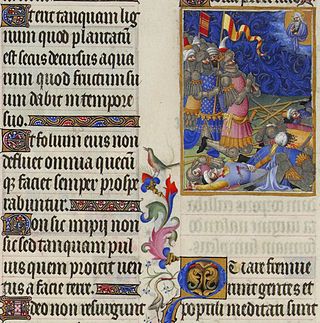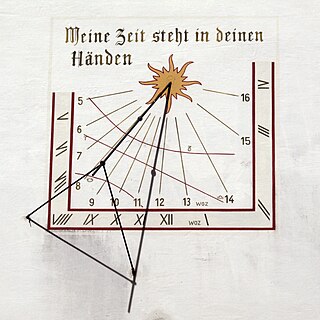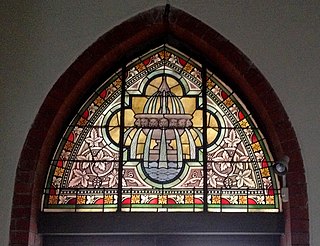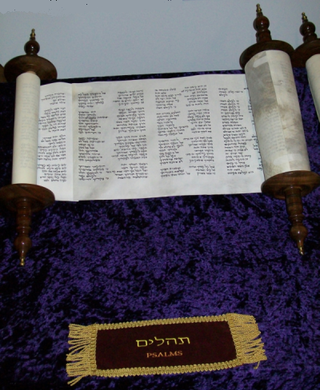Related Research Articles

Judaism considers some names of God so holy that, once written, they should not be erased: יהוה, אֲדֹנָי (Adonai), אֵל, אֱלֹהִים, אֵל שַׁדַּי, שַׁדַּי, יְהֹוָ֥ה צְבָאֽוֹת and צְבָאֽוֹת ; some also include I Am that I Am. Early authorities considered other Hebrew names mere epithets or descriptions of God, and wrote that they and names in other languages may be written and erased freely. Some moderns advise special care even in these cases, and many Orthodox Jews have adopted the chumras of writing "G-d" instead of "God" in English or saying Ṭēt-Vav instead of Yōd-Hē for the number fifteen or Ṭēt-Zayin instead of Yōd-Vav for the Hebrew number sixteen.
Gentile is a word that usually means "someone who is not a Jew". Other groups that claim Israelite heritage, notably Mormons, sometimes use the term gentile to describe outsiders. More rarely, the term is used as a synonym for heathen or pagan. As a term used to describe non-members of a religious/ethnic group, gentile is sometimes compared to words used to describe the "outgroup" in other cultures.
In its primary meaning, the Hebrew word mitzvah refers to a commandment commanded by God to be performed as a religious duty. Jewish law in large part consists of discussion of these commandments. According to religious tradition, there are 613 such commandments.

Exegesis is a critical explanation or interpretation of a text. The term is traditionally applied to the interpretation of Biblical works. In modern usage, exegesis can involve critical interpretations of virtually any text, including not just religious texts but also philosophy, literature, or virtually any other genre of writing. The phrase Biblical exegesis can be used to distinguish studies of the Bible from other critical textual explanations.
Hallelujah is an interjection from the Hebrew language, used as an expression of gratitude to God. The term is used 24 times in the Hebrew Bible, twice in deuterocanonical books, and four times in the Christian Book of Revelation.
In the Hebrew Bible and Jewish religious law, a mamzer is a person who is born as the result of certain forbidden relationships or incest, or the descendant of such a person. Mamzer status is not synonymous with the traditional western definition of illegitimacy, since it does not include children whose mothers were unmarried when they were born.
El Shaddai or just Shaddai is one of the names of the God of Israel. El Shaddai is conventionally translated into English as God Almighty, but its original meaning is unclear.

Psalm 83 is the 83rd psalm of the Book of Psalms, beginning in English in the King James Version: "Keep not thou silence, O God". In the slightly different numbering system used in the Greek Septuagint and Latin Vulgate translations of the Bible, this psalm is Psalm 82. In Latin, it is known as "Deus quis similis erit tibi ne taceas". It is one of the 12 Psalms of Asaph. This psalm is the last of the Psalms of Asaph, which include Psalms 50 and 73 to 83. It is also the last of the "Elohist" collection, Psalms 42–83, in which the one of God's titles, Elohim, is mainly used. It is generally seen as a national lament provoked by the threat of an invasion of Israel by its neighbors.
"It is time to work for the Lord" is the first half of a verse in Psalms that has served as a dramatic slogan at several junctures in rabbinic Judaism.
Not in Heaven is a phrase found in a Biblical verse, Deuteronomy 30:12, which encompasses the passage's theme, and takes on additional significance in rabbinic Judaism.
Ashrei is a prayer that is recited at least three times daily in Jewish prayers, twice during Shacharit and once during Mincha. The prayer is composed primarily of Psalm 145 in its entirety, with Psalms 84:5 and Psalms 144:15 added to the beginning, and Psalms 115:18 added to the end. The first two verses that are added both start with the Hebrew word ashrei, hence the prayer's name.
In Judaism, views on abortion draw primarily upon the legal and ethical teachings of the Hebrew Bible, the Talmud, the case-by-case decisions of responsa, and other rabbinic literature. While all major Jewish religious movements allow or encourage abortion in order to save the life of a pregnant woman, authorities differ on when and whether it is permitted in other cases.
"They have pierced my hands and my feet", or "They pierced my hands and my feet" is a phrase that occurs in some English translations of Psalm 22:16. The text of the Hebrew Bible is obscure at this point, and Jewish and some Christian commentators translate this line differently, although there is no evidence of a deliberate mistranslation.

Psalm 1 is the first psalm of the Book of Psalms, beginning in the English King James Version: "Blessed is the man", and forming "an appropriate prologue" to the whole collection. The Book of Psalms is part of the third section of the Hebrew Bible, and a book of the Christian Old Testament. In Latin, this psalm is known as "Beatus vir" or "Beatus vir, qui non abiit".

Psalm 2 is the second psalm of the Book of Psalms, beginning in English in the King James Version: "Why do the heathen rage". In Latin, it is known as "Quare fremuerunt gentes". Psalm 2 does not identify its author with a superscription, but Acts 4:24–26 in the New Testament attributes it to David. According to the Talmud, Psalm 2 is a continuation of Psalm 1.

Psalm 31 is the 31st psalm of the Book of Psalms, beginning in English in the King James Version: "In thee, O LORD, do I put my trust". In Latin, it is known as "In te Domine speravi". The Book of Psalms is part of the third section of the Hebrew Bible, and a book of the Christian Old Testament. In the slightly different numbering system used in the Greek Septuagint version of the Bible, and in its Latin translation, the Vulgate, this psalm is Psalm 30. The first verse in the Hebrew text indicates that it was composed by David.

Psalm 36 is the 36th psalm of the Book of Psalms, beginning in English in the King James Version: "The transgression of the wicked saith within my heart". The Book of Psalms is part of the third section of the Hebrew Bible, and a book of the Christian Old Testament. In the slightly different numbering system used in the Greek Septuagint and Latin Vulgate translations of the Bible, this psalm is Psalm 35. In Latin, it is known as Dixit iniustus or Dixit injustus. The psalm is a hymn psalm, attributed to David.

Psalm 116 is the 116th psalm of the Book of Psalms, beginning in English in the King James Version: "I love the LORD, because he hath heard my voice and my supplications". It is part of the Egyptian Hallel sequence in the Book of Psalms.
Isaiah 40 is the fortieth chapter of the Book of Isaiah in the Hebrew Bible or the Old Testament of the Christian Bible, and the first chapter of the section known as "Deutero-Isaiah", dating from the time of the Israelites' exile in Babylon. This book contains the prophecies attributed to the prophet Isaiah, and is one of the Books of the Prophets. Parts of this chapter are cited in all four canonical Gospels of the New Testament.
Chidush, sometimes used in its plural form, chidushim, is a novel interpretation or approach. Historically referring to Torah topics, the term is widely used in rabbinic literature to describe a form of innovation that is made inside the system of the halakha, as distinguished from shinuy, an innovation outside tradition.
References
- ↑ "Psalms 116:6". Bible Study Tools.
- ↑ Shabtai, David. Journal of Halachah and Contemporary Society
- Babylonian Talmud . Shabbat 129b, Yevamot 12b and 82a
- Torat Chesed Shneur Zalman of Lyady, (Lublin) EH 44
- Igrot Moshe, Moshe Feinstein. EH 1:63 and 4:73
- Freedman, Benjamin. Duty and healing: Foundations of a Jewish bioethic Routledge, 1999. (See section 4.)